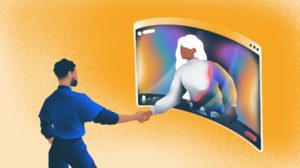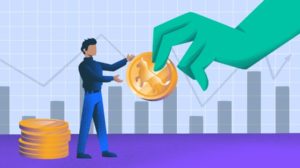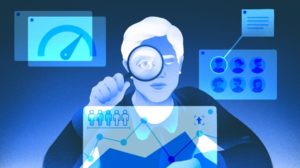Alarmist headlines abound about how AI and robots are stealing jobs from humans.
The fears are spreading beyond concern over blue-collar jobs. Now there are greater worries that even white-collar jobs that require additional training and education will be replaced by artificial intelligence and AI-powered robots.
Crunchbase News turned to AI expert, SparkCognition CEO and Founder Amir Husain, to get his thoughts on the matter. Austin-based AI startup SparkCognition has raised $56.5 million over the past year and $73.5 million since its inception in 2013. Husain is also the author of The Sentient Machine: The Coming Age of Artificial Intelligence. In 2016, he was ranked among the Top 100 global Artificial Intelligence influencers by Onalytica.
On top of that, Husain is also a prolific inventor with 22 awarded and over 40 pending U.S. patent applications to his credit. In 2013, a low-cost computing platform Husain invented was added to the collection of the Computer History Museum in Mountain View.
So what does he have to say about AI’s impact on jobs?
Well, he’s realistic.
“If you take the long view, it’s really quite likely that most of the jobs that we see around us today will disappear and will be done by machines,” he told Crunchbase News. “One hundred plus years ago, half the population was focused on agriculture. And today it’s less than 2 percent, but yet we’re feeding five times the number of people. Obviously, there has been a several hundred-fold increase in the productivity there which is another fancy way of saying there’s much, much fewer jobs. And this will continue.”

Picture by Pasi Salminen, via SparkCognition
Technological innovation has technically been taking jobs from humans for centuries, Husain points out. Humans replicated the human muscle – first with the steam engine and later with the internal combustion engine – which in turn gave birth to the Industrial Revolution. As a result, jobs that required the human beings as a provider of that physical force dissipated over time.
“Now what we’re doing is replicating the cognitive abilities of human beings,” he said. “And when you think about it, that is what man is – cognition and muscle. Basically, those are the two big elements. So I think yes when both of these things are replicated, more jobs will be lost, and we are on the path to do that.”
But at the same time, he is not cold about it. For example, while Husain acknowledges the growing use of AI and robotics in the field of healthcare, he acknowledges that machines will never be able to replace “the human touch.”
“There’s the analysis part of what the doctor does, the diagnosis part, and then there’s the actual caregiving,” he noted. “I think when it comes to caregiving, people are always going to want the human touch.”
Besides agriculture, manufacturing is another big sector that has already been impacted by robots.
“Robots have completely taken over manufacturing,” he said. “Even in low-cost manufacturing destinations like China, they find it more cost effective to buy millions of robots in comparison to keeping relatively lower paid workers around on the factory floor.”
The future of AI will involve more narrow intelligence, Husain believes, which is specialized in certain areas and can exceed human capacity in those areas – but isn’t broadly as capable as a human being.
“That’s where we are now,” he said. “Over the long term as the technology is adopted, most of our present jobs will go away.”
To Husain, the question of whether jobs will go away is moot. He believes the real questions are will we have a way to survive economically and will our needs be fulfilled? Furthermore, will we be able to find satisfaction in the pursuit of some labor that is an expression of our higher gifts and of our traits?
“The answers to all of those [questions] are yes, we can certainly do that, but it requires a societal agreement—a rewriting of the social contract,” he said. “We will have to to rewrite the economic norms that govern how somebody is considered economically valuable in a society, and in an economy.”
So When?
So if AI is replacing jobs, when will that happen?
At the rate at which AI progress is occurring today, there will likely be some fundamental breakthroughs over the next five to 10 years, Husain predicts. “There will probably be other kinds of tasks that we’ll be able to have machines perform which today they can’t,” he said.
Robotics is similarly progressing at a very fast pace.
“Robots can now do backflips. From a mechanical standpoint, that’s never been possible before,” Husain said. “When you combine all of these innovations, I think the time is about 15-30 years out, when we’ll actually see almost magical machines that an observer today will look at and say, ‘Wow, this is all I imagined in science fiction and maybe then some.’ So I think that really is the window.”
And according to to Husain, politicians need to focus more on preparing for these things. If they don’t, it could have serious consequences.
“If we’re caught unprepared and we enter this era in a way that is unplanned, then I think we will not be immune from the kinds of destabilizations and disruptions that we have so far only seen on TV unfolding in other parts of the world,” he said. “…And unfortunately, when you stress a population, you find that the uglier aspects of human nature start to manifest themselves, and that certainly is not something to look forward to.”
Back To The Numbers
We thought it would be good to get the perspective of a non-AI executive on this controversial topic. So I talked to Joseph Brusuelas, chief economist at New York-based RSM US LLP, to get thoughts from someone outside the industry.
“Technological unemployment is not anything new,” he said. “It’s been a feature of capitalism over the past 200 years, and there’s no reason to believe that it’s likely to stop. In fact, it’s likely to accelerate.”
For many years, man could not invent the sort of AI or robotics that could conduct routine tasks with regularity and precision. “We are quickly approaching a period where that will occur,” Brusuelas said. “Thus, there will be some wholesale disruption across different industries.”
However, it seems to Brusuelas that there’s been too much fanfare “about the imminent end of routine work.” He points to the area of automated vehicles and truck drivers, for example. Truck drivers are the No. 1 employment category for men aged 25-54.
“The technology is not quite there,” Brusuelas said. “Now we should not take solace that it will never be there. Because it will. But policymakers have a chance to think about what the future of work means, and to put in place policy pathways that can facilitate a transition for those that are in work categories more likely to experience significant displacement.”
Today, artificial intelligence goes way beyond the field of home automation and as technologies continue to advance, it’s likely more jobs will be impacted. But it’s up to us to determine to what degree, and in what ways this change will occur. Ultimately, it’s safe to say that planning and preparation are the key to whether artificial intelligence helps, or hurts, our society and economy.
Illustration: Li-Anne Dias

Stay up to date with recent funding rounds, acquisitions, and more with the Crunchbase Daily.





67.1K Followers